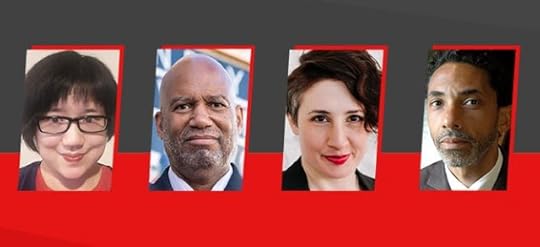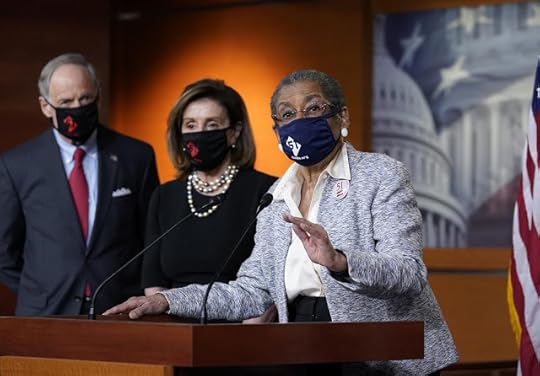Mark Anthony Neal's Blog, page 227
April 24, 2021
Belabored: Black Against Amazon, with Steven Pitts and Robin D.G. Kelley

"The workers at the Amazon facility in Bessemer didn’t succeed in winning a union when all the votes were counted, but nevertheless the story has drawn attention to the company’s labor practices and the struggles of the workers in its facilities. Belabored teamed up with Steven Pitts of Organizing Upgrade’s Black Work Talk podcast to talk about the state of the Black working class. We were joined by Robin D.G. Kelley, author of many books you should read about social movements and labor history, but perhaps most importantly for this conversation, one of my all-time favorites: Hammer and Hoe: Alabama Communists During the Great Depression (the book is currently available to download for free at the publishers’ website). Kelley is also Distinguished Professor and Gary B. Nash Endowed Chair in U.S. History at UCLA, and we invited him to discuss the historical and present conditions in Bessemer."
Soul Expressions 2.0 · Belabored: Black Against Amazon, with Steven Pitts and Robin D.G. KelleyStuck in The Studio: Ayanah Moor

"On this episode of CCMA Creates: Stuck in the Studio features Ayanah Moor, an artist whose work explores blackness, gender, desire and language. She discusses her recent return to painting, inspirations behind her work and her solo exhibition at the Cleve Carney Museum of Art."
April 23, 2021
Wesley Lowery Examines the Effects of the Water Crisis on Jackson, Mississippi Residents

"60 Minutes+ correspondent Wesley Lowery joins CBS This Morning with a preview of his report on the failing infrastructure that contributed to the water crisis in Jackson, Mississippi. Lowery speaks with residents of the state's capital and explores whether there are racial implications involved in the impact on black residents."
D.C. Statehood is a Voting Rights Issue…and Racial Justice Issue by Ben Jealous

D.C. Statehood is a Voting Rights Issue… and Racial Justice Issue
by Ben Jealous | @BenJealous | NewBlackMan (in Exile)
Washington, D.C. has a higher percentage of Black residents than any state in the country, and they have no voting representation in Congress. This is systemic racism in action. It is long past time to give Washington’s 712,000 residents the representation they deserve by making D.C. our 51st state.
It is shameful that people who live in the nation’s capital have no say in Congress. And it is unacceptable that local laws and budgets passed by D.C. elected officials can be overturned by members of Congress who decide to meddle in local decision-making. That explains why Washington, D.C.’s license plates include the slogan, “End taxation without representation,” a rallying cry by American colonists against the tyranny of British rule.
The disenfranchisement of hundreds of thousands of D.C. residents is fundamentally un-American and there is no good reason to allow it to continue. There are bogus reasons to oppose statehood, and some Republicans in Congress have been trotting them out now that legislation to admit Washington, D.C. as a statehood bill is moving forward in Congress.
Some claim that Washington, D.C. is too small to be a state. But D.C. has more residents than either Vermont or Wyoming. There are currently six states whose population is less than a million. D.C. pays more federal taxes than 21 states—and more federal taxes per person than any state.
Some make the false claim that it would require a constitutional amendment to make Washington, D.C. a state. Not true. The Constitution clearly gives Congress the authority to admit new states.
That’s how every one of the 37 states that were not initially part of the U.S. have joined the country. The original District of Columbia was created out of land from Maryland and Virginia. In 1846, a good chunk of D.C. was returned to Virginia. No constitutional amendment was required then, and none is required now to admit Washington, D.C. as a new state. Some objections are so idiotic, frankly, that they must be a cover for pure partisanship or worse.
In March, a Heritage Foundation legal fellow testifying before Congress said that D.C. residents shouldn’t get representation in Congress because they can already influence congressional debates by placing yard signs where members of Congress might see them on their way to work. One Republican congressman said (wrongly) that D.C. would be the only state without a car dealership. Another said that D.C. doesn’t have enough mining, agriculture, or manufacturing. Mitch McConnell said the plan to make D.C. a state was evidence of “full bore socialism on the march.”
At least some Republicans are honest about their real reason for opposing statehood: they just don’t want to let D.C. voters elect Democratic officials who will support progressive policies supported by the majority of the American people.
But that is not a principled position. None of the objections to D.C. statehood hold water, especially when weighed against the basic injustice of disenfranchising hundreds of thousands of people.
Washingtonians have fought in every U.S. war. About 30,000 D.C. residents are veterans. But D.C.’s mayor does not even have the ability that governors have to mobilize its own National Guard—a fact that proved to be deadly during the Jan. 6 Capitol Insurrection.
The bottom line in this: how can we hold ourselves out as a model of democracy when we are the only democratic country in the world that denies representation and self-governance to the people who live in its capital? We can’t.
As the Biden administration recognized in announcing its support for D.C. statehood, it is long past time to correct this injustice. The House of Representatives voted on April 22, to admit Washington, D.C. as a state. Senate leaders must not allow filibuster rules or Republican resistance to prevent Congress from righting this wrong.
***
Ben Jealous serves as president of People For the American Way and People For the American Way Foundation. Jealous has decades of experience as a leader, coalition builder, campaigner for social justice and seasoned nonprofit executive. In 2008, he was chosen as the youngest-ever president and CEO of the NAACP. He is a graduate of Columbia University and Oxford, where he was a Rhodes Scholar, and he has taught at Princeton and the University of Pennsylvania.
@font-face {font-family:Helvetica; panose-1:0 0 0 0 0 0 0 0 0 0; mso-font-charset:0; mso-generic-font-family:auto; mso-font-pitch:variable; mso-font-signature:-536870145 1342208091 0 0 415 0;}@font-face {font-family:"Cambria Math"; panose-1:2 4 5 3 5 4 6 3 2 4; mso-font-charset:0; mso-generic-font-family:roman; mso-font-pitch:variable; mso-font-signature:3 0 0 0 1 0;}@font-face {font-family:Calibri; panose-1:2 15 5 2 2 2 4 3 2 4; mso-font-charset:0; mso-generic-font-family:swiss; mso-font-pitch:variable; mso-font-signature:-536859905 -1073732485 9 0 511 0;}p.MsoNormal, li.MsoNormal, div.MsoNormal {mso-style-unhide:no; mso-style-qformat:yes; mso-style-parent:""; margin:0in; mso-pagination:widow-orphan; font-size:12.0pt; font-family:"Calibri",sans-serif; mso-ascii-font-family:Calibri; mso-ascii-theme-font:minor-latin; mso-fareast-font-family:Calibri; mso-fareast-theme-font:minor-latin; mso-hansi-font-family:Calibri; mso-hansi-theme-font:minor-latin; mso-bidi-font-family:"Times New Roman"; mso-bidi-theme-font:minor-bidi;}.MsoChpDefault {mso-style-type:export-only; mso-default-props:yes; font-family:"Calibri",sans-serif; mso-ascii-font-family:Calibri; mso-ascii-theme-font:minor-latin; mso-fareast-font-family:Calibri; mso-fareast-theme-font:minor-latin; mso-hansi-font-family:Calibri; mso-hansi-theme-font:minor-latin; mso-bidi-font-family:"Times New Roman"; mso-bidi-theme-font:minor-bidi;}div.WordSection1 {page:WordSection1;}April 22, 2021
Left of Black S11 · E24 | The Blues Foundation of Funk with Tony Bolden

Funk, in both dance and in music, conveys a deep sincerity and honesty in communicating the emotional depth of the Black artist, from James Brown to Chaka Khan to Sly Stone and even today's Jazmine Sullivan. But is there another way to think about these performers as organic intellectuals who are able to feel what is happening in the culture and bring language to that experience? Tony Bolden, Associate Professor of African and African-American Studies at the University of Kansas, joins Left of Black host and Duke University Professor Mark Anthony Neal to discuss how the blues laid the foundation for funk music. Prof. Bolden's latest book, Groove Theory: The Blues Foundation of Funk, was published by University Press of Mississippi.
Marcus Miller: Electric Miles

"Miles Davis famously once said, "I have to change; it's like a curse" – and that's exactly what he did throughout his entire career. In 1969, the trumpet icon may have pulled off his greatest reinvention yet: he went "electric." Davis turned the jazz world upside down, marking the beginning of what's called the Electric Miles period – groundbreaking, raw, controversial and, now, classic. "He had been evolving all along," electric bassist (and Davis collaborator) Marcus Miller says about his idol. "In the same way that America's evolution from the 1930s to the early '60s was absolutely an evolution. It was a revolution from the '60s to the '70s. And Miles' music was the same"'" -- Jazz Night in America
Why Implicit Bias Training For Police Doesn't Work — And What Can Be Done To Combat Racism

"The guilty verdict in the case of former Minneapolis police officer Derek Chauvin is seen by many as an important step toward police accountability. But many activists acknowledge much more needs to be done to combat racism in police departments across the country. In the aftermath of recent police killings of Black Americans, many departments have implemented implicit bias training for officers. Here & Now's Tonya Mosley speaks with Jack Glaser, a University of California, Berkeley social psychologist whose work focuses on police interactions and implicit bias."
April 21, 2021
Uneasy: Vijay Iyer's New Album

"Uneasy is the latest album from pianist, MacArthur fellow, and Harvard professor in the departments of music and African and African American studies, Vijay Iyer, along with collaborators Tyshawn Sorey on drums and bassist Linda May Han Oh. Iyer wrote the compositions over the last two decades with ideas of justice, equity, and identity in mind, and in response to events, including the death of Eric Garner in 2014. Iyer joins All Of It for a "Listening Party"."
How Notions of Masculinity Have Evolved in Hip Hop Over Time

"Throughout his chart-topping career, DMX was often forthcoming about his challenging personal life. The artist grew up in housing projects in Yonkers, and was physically abused by multiple adults in his life. DMX often displayed his vulnerability in the lyrics of his songs. And the rapper also frequently gave back to the community he grew up in, through charity work with children. Today, the tenderness that was one part of DMX’s personality is something many rappers are even more openly exploring. Changing notions of masculinity have allowed musicians to be more vulnerable in both their work and stylistic choices. This includes Kid Cudi, who wore a floral dress on Saturday Night Live this month in tribute to Kurt Cobain, and Lil Nas X, who recently released a provocative music video for his song “Montero (Call Me By Your Name)." Craig Jenkins, music critic for New York Magazine, joined The Takeaway to discuss this evolution."
Twenty Years Later: The Police Assault on Abner Louima and What it Means

"On August 9, 1997, police officers took Haitian immigrant Abner Louima — after yanking his pants down to his knee — in the bathroom of the 70th precinct in Brooklyn. There, Officer Justin Volpe used a broken broomstick to sexually assault the handcuffed man. Word of the attack shocked the city, and Louima would eventually testify in a federal trial that sent two officers to prison.
But today, many young New Yorkers don’t know about the case. Sitting outside a restaurant in downtown Brooklyn, 18-year-old Christopher Watson said he had not heard of Louima, though he could name others who died, like Michael Brown and Sandra Bland. "Those are the recent ones I heard," he said.
When WNYC News approached older New Yorkers, some initially confused Louima with Amadou Diallo. He was the West African immigrant who was shot 41 times in 1999 by Bronx police officers who mistakenly thought he was pulling a gun out of his pocket instead of a wallet."
Mark Anthony Neal's Blog
- Mark Anthony Neal's profile
- 30 followers



